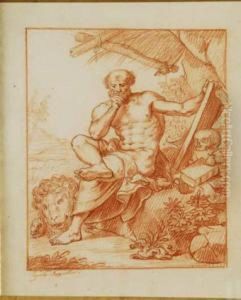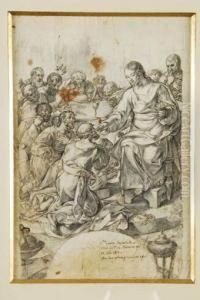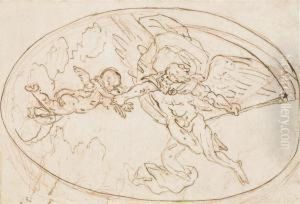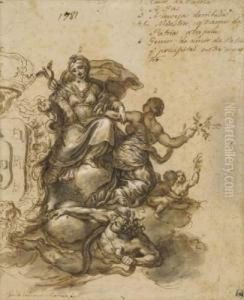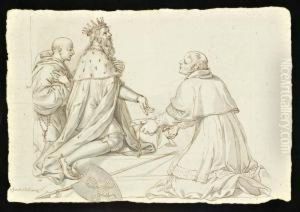Cyrillo Volkmar Machado Paintings
Cyrillo Volkmar Machado was a Portuguese painter, architect, and art writer born on May 1, 1748, in Lisbon, Portugal. He is known for his contributions to Portuguese art during the late 18th and early 19th centuries, a period that witnessed significant cultural and political transformations in Europe, including the Enlightenment and the Napoleonic Wars.
Machado was the son of a Brazilian father and a German mother. His early life and education remain somewhat obscure, but it is known that he was initially self-taught before traveling to Rome to further his studies. In Rome, he was influenced by the prevailing neoclassical aesthetic, which he would later introduce to Portuguese art. He became adept in painting, particularly in the creation of religious works, portraits, and historical scenes.
Upon returning to Portugal, Machado became an influential figure in the artistic scene. He was a professor at the Royal Academy of Fine Arts of Lisbon, where he taught many students who would go on to become significant artists in their own right. Machado's involvement with the Academy was part of a broader effort to modernize art education in Portugal, reflecting the educational reforms of the Marquis of Pombal, who sought to align Portugal with Enlightenment ideals.
In addition to his teaching, Machado wrote extensively on art, including a treatise titled 'Principios de Desenho' (Principles of Drawing) and the nine-volume 'Collecção de Memorias Relativas às Vidas dos Pintores, e Escultores, Arquitectos, e Gravadores Portugueses' (Collection of Memoirs Relating to the Lives of Portuguese Painters, Sculptors, Architects, and Engravers). These works were instrumental in documenting the history of Portuguese art and remain valuable to art historians today.
Machado's career as an artist and academic was marked by his commitment to the neoclassical style, which he believed was the epitome of artistic taste and refinement. His works are characterized by their classical composition, clear lines, and balanced proportions, and they often convey moral or didactic messages, as was typical of neoclassical art.
Cyrillo Volkmar Machado's influence extended beyond his own works, as he played a crucial role in shaping the trajectory of Portuguese art through his teachings and writings. He died on June 18, 1823, in Lisbon. Today, Machado's legacy is appreciated for its portrayal of the cultural ambitions of his time and its impact on the development of the visual arts in Portugal.
